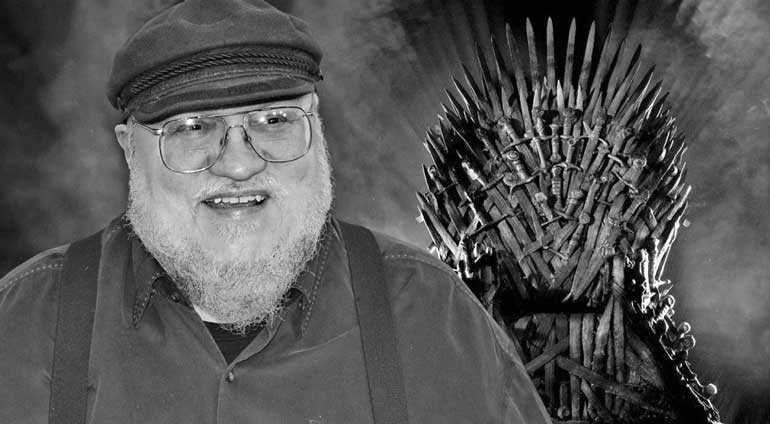Monday Feb 23, 2026
Monday Feb 23, 2026
Saturday, 25 May 2019 00:00 - - {{hitsCtrl.values.hits}}

George R.R. Martin can still deliver the ending that fans deserve
Esquire.com: There’s an old interview with George R.R. Martin at a convention in 1998 shortly after the publication of ‘A Clash of Kings,’ the second novel in his ‘A Song of Ice and Fire; series. At the time of this interview, George is a largely unknown fantasy author, and his book hadn’t even been published in the United States yet.
As he says in the grainy footage, “I’ve been writing these books off and on since 1971 and I suspect I’ll still be writing them five to six years from now before I can finally wind up the story the way I see it winding up. I love television and I’d love to see some of my books made if they’re done right. The very size of it would make it very difficult to do as a film. They’re doing ‘Lord of the Rings’ as three films and all three volumes of ‘Lord of the Rings’ are about the size of one of my books, so I already have nine films by that standard.”
Even then, more than two decades ago, George had an idea of how this story, which he’d been creating since the ’70s, would end up. He was also sceptical—rightly so—about how this story could be adapted to film or TV. As it turns out, George was both right and wrong. He’s wrong that he’ll still be writing them five to six years from now. In reality it’s been more than 20 years, and he still hasn’t finished those books. But, he’s right about adapting this story to film. It would be very difficult and require more room than nine films to tell this story.
In fact, it would take something like 25 ‘Lord of the Rings’-length movies to tell George R.R. Martin’s epic fantasy saga. After spending nearly half a century building the world of Westeros, Martin’s series finally has a version of its ending on Sunday.
And you have to wonder what this younger, shaggier version of George R.R. Martin would think of the way HBO and showrunners David Benioff and D.B. Weiss concluded the story. Watching that old interview, it’s clear very early on that Martin prided himself on the scope of his books. They were long because they needed to be long. He needed to outline thousands of years of history, multiple generations of great houses, the world events of civilisations on different continents. He’d been writing this thing off and on since the early ’70s, and is still writing it, because this story can’t be rushed.
But, sadly, that’s exactly what HBO and Benioff and Weiss did. It’s no secret that the quality of the show dropped rapidly after ‘Game of Thrones’ passed George R.R. Martin’s books after the fifth season. And it was after Season Six wrapped that Benioff and Weiss decided to end the show.
As Benioff said at the conclusion of the sixth season: “It’s not just trying not to outstay your welcome. We’re trying to tell one cohesive story with a beginning, middle and end. We’ve known the end for quite some time and we’re hurtling towards it. Those last images from the [season six finale] showed that. Daenerys is finally coming back to Westeros, Jon Snow is king of the North and Cersei is sitting on the Iron Throne. And we know the Night King is up there, waiting for all of them. The pieces are on the board now. Some of the pieces have been removed from the board and we are heading toward the end game.”
To an extent you have to respect this. Most shows absolutely overstay their welcome—just look at the last nearly two decades of ‘The Simpsons’. But ‘Game of Thrones’ was different. It had to be long. It needed to be slow, and thoughtful, and most importantly take its time.
So to think that Benioff and Weiss wanted to do this in the 13 episodes that comprised Seasons Seven and Eight is ludicrous. And as any fan of this series could have predicted at the time, it didn’t work.
That’s why Seasons Seven and Eight felt so ridiculously rushed. That’s why people started teleporting, why once complex characters suddenly became flat, vanished altogether, or morphed into nothing but convenient Deus Ex Machina, or why producers literally left coffee cups and water bottles in shots. Those prop errors are the perfect metaphor for these last two seasons, where no one slowed down to think about the product they were putting out. No one stopped to consider these beloved character arcs or the sheer logic of the narrative. Instead Benioff and Weiss wanted bigger battles! They wanted spectacle not story.
And the honest truth is that the ‘Game of Thrones’ writers were simply not equipped to carry out and conclude Martin’s story. Yes, George consulted on the script and gave Benioff and Weiss an outline for how he will have their story end. An outline is not a story, though. Martin could tell you that, any writer or reader could tell you that. But these final seasons felt like nothing more than an outline with a few big battles to make it seem exciting.
I don’t envy Benioff and Weiss’ position. How do you finish the greatest fantasy saga of our generation? How do you appease fans who have read thousands of pages, dedicated hundreds of hours and even decades to a story? But it seems that at some point Benioff and Weiss developed a kind of contempt for these same fans. ‘Oh you wanted a battle? Here’s a battle.’ That seemed to be their thought process in these final seasons.
Any reader of the book can tell you that ‘Game of Thrones’ is not about battles. In fact, one of the biggest battles in the show happened off-page in the books.
So let’s talk about what happened in the series finale. Daenerys is looking very much like a tyrant after her massacre of King’s Landing. Tyrion, with his entire family dead, sees the devastation and resigns as Dany’s Hand of the Queen. She imprisons him, but before she can put Tyrion to death by fire, Jon goes to visit Daenerys. After a very romance novel-looking scene between the two, Jon stabs and kills Daenerys. Sensing something was wrong, Drogon flies to his mother’s side, where he burns the thing that led to Dany’s death – The Iron Throne. He flies off with her body—probably to Essos. It’s a poetic, if obtuse, twist that fans had been expecting for years now.
From there, the show somewhat awkwardly jumps ahead a few weeks. Grey Worm and the Unsullied have taken Jon prisoner alongside Tyrion. Arya, Sansa, Bran, and the remaining lords of the Seven Kingdoms gather in the dragon pit outside of King’s Landing to decide what the fuck they’re going to do now. The tone suddenly shifts from the dour ashen (or was it snow) fallout from the battle to bright and weirdly comical.
Samwell Tarly wisely suggests a democracy in Westeros—and he’s laughed back into his seat. Tyrion has another suggestion: How about the lords of each kingdom choose the next king? In a nice extremely Tyrion speech, he suggests that it should be ... Bran. Yes, Bran. The same Bran who didn’t share any important details about any of the battles that could have saved thousands of lives. The same Bran who now just wargs into birds for no apparent reason. The same Bran who appears to no longer feel love or anger or happiness or sadness. The same Bran who was awful to Meera Reed after she risked her life and her brother sacrificed his life for him.
I’ll be honest I laughed when Bran was elected king. Then I laughed as Jon was sentenced back to the wall. I laughed again when, in a weird moment of meta, self-aware comedy, Jon asked why they even have the Night’s Watch anymore. Good point! Why I laughed when Sansa, for no clear reason, wanted the North to be separate even though her brother is king.
I laughed as they set up their new government. I laughed thinking about how this is just as corruptible and useless as their previous government or any other government could be. I laughed when it became clear that Tyrion appears to be the real leader of the Seven Kingdoms (six) while Bran continued to do whatever it is Bran does.
I laughed that none of the prophecies mattered. I laughed that none of the character arcs mattered. I laughed that no one bothered to explain why Bran had fought the Night King so many times before. I laughed that the Children of the Forest just ceased to be. I laughed that Arya never used her Faceless powers (you know, actually taking someone’s face) this season after she spent what felt like a billion years learning them. I laughed that the kid who breastfed until he was, like, 12 years old is still alive and looks pretty damn good.
Sure, I loved to see SER Podrick Payne, my sweet boy, finally getting the respect he deserves, Jon reuniting with Ghost, Brienne filling out Jaime’s page in history, and good Samwell Tarly writing ‘A Song of Ice and Fire’ (or helping to at least).
For the most part, though, it felt comically lazy. It was half-baked. But at least it was an ending. I couldn’t help but think that Tyrion explained it the best in this episode: “No one is very happy, which means it’s a good compromise I suppose.”
And an ending like this one is inadvertently the best thing Benioff and Weiss could have done for Martin. Now, 48 years after he began building this vast, detailed world, Martin has a chance to finish it on his own terms. He can still deliver the ending that fans deserve. And what is encouraging is that—unlike the HBO show—he’s taking his time to do it right.
‘Game of Thrones’ may be over, but ‘A Song of Ice and Fire’ only truly ends the way Martin wants it to end. The conclusion of this HBO show was fine. It was a good ride, everyone. We got to experience the great television event of our time. Often the experience was better than the show itself. Now we just need to wait for Martin to give us the real conclusion. I, for one, will be reading.
